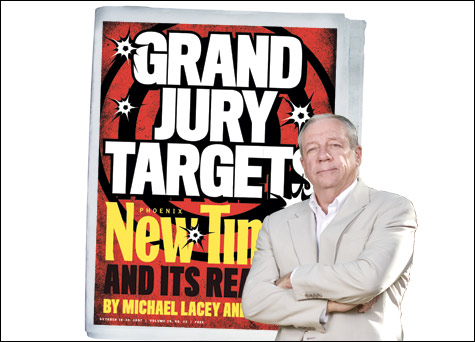
IRON MIKE LACEY: He fought the law, and the law lost |
Nice and easy
Following the October 18 arrests of Village Voice Media executives Mike Lacey and Jim Larkin, more than 50 papers belonging to the Association of Alternative Newsweeklies — including the Phoenix — agreed to post links to sites revealing Maricopa County Sheriff Joe Arpaio's home address, the publication of which made PhoenixNew Times a grand-jury target. For a list, go to aan.org. The shreiff's address (which is 12808 North Via Del Sol, Fountain Hills) is easily found at zabasearch. |
Here in Boston, media observers waxed indignant when a judge barred a local TV station from reporting the autopsy results of two Boston firefighters earlier this month. And rightfully so: the prior-restraint ruling by Suffolk Superior Court Judge Merita Hopkins, which was promptly overturned, was a model of bad jurisprudence. But a pair of recent developments in the Sun Belt serves as a useful reminder that antagonism between government and the press can get a whole lot nastier.
The first case, and the better-known of the two, involves the October 18 misdemeanor arrests in Arizona of Mike Lacey and Jim Larkin, the executive editor and CEO, respectively, of Village Voice Media (VVM). Their crime: reporting, in a cover story in the VVM-owned alt-weekly Phoenix New Times, on legally protected details of an ongoing grand-jury investigation of the paper — including a subpoena request for information (IP addresses, domain names, “cookie” data, etc.) on every single individual who’d looked at the paper’s Web site since 2004. That investigation, in turn, stemmed from a July 2004 article on the real-estate holdings of Maricopa County Sheriff Joe Arpaio, a long-time New Times nemesis and a native of Springfield, Massachusetts.
Arpaio is a conservative crank beloved, in certain quarters, for “reinstating the chain gang, making inmates wear pink underwear, and putting convicted criminals in tents in the desert to ease overcrowding,” as a Lou Dobbs Tonight correspondent approvingly put it. After noting, in the July 2004 story, that information on several Arpaio properties was redacted from state records due to an alleged threat to Arpaio’s life, New Times mocked the claim — and, for good measure, published Arpaio’s home address, asking: “Why shouldn’t Old Man Joe be in the same glass house as the rest of us?” Disclosing that online could have been illegal in Arizona — but only if a genuine threat to Arpaio or his family existed, and if that threat was “reasonably apparent” to New Times. (For its part, New Times subsequently noted that Arpaio’s address could easily be located elsewhere on the Web.)
New Times’ October 18 story on these and other details of the grand-jury investigation proved to be a strategic masterstroke. The next day, Maricopa County Attorney Andrew Thomas announced that his office was dropping all charges against New Times; panned special prosecutor Dennis Wilenchik for trying to arrange a private meeting with the judge overseeing the grand jury; and announced Wilenchik’s dismissal. Overnight, Larkin and Lacey went from wronged martyrs to vindicated heroes. “This really is a win for the Constitution,” Lacey announced, according to the Arizona Republic. That’s for sure.